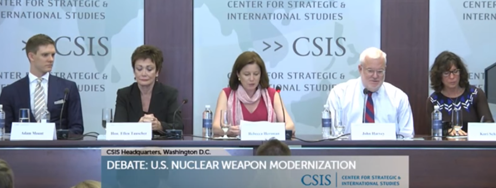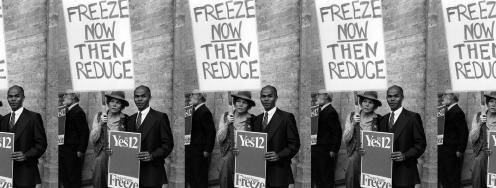Obama Builds Momentum on Nuclear Policy at UN
Obama gave a tough speech, strong on American commitments but also a strong call for other nations to fulfill their responsibilities. He told the world that America wanted a world without nuclear weapons; he told America that this path would make us safer and stronger; he told his own officials that he expected them to deliver on his promise.
There were no apologies for past US actions, no shirking of the special roles America holds as the most powerful nation in the world, and no shifting of blame onto one or two "rogue" nations. He gave a balanced, visionary and, at times, personal appeal to the nations of the world to cooperate to prevent the global catastrophes - particularly the nuclear threats - that await us if we fail to act together. It is up to all of us to help achieve this ambitious agenda.
Below is an excerpt of this morning's speech:
The choice is ours. We can be remembered as a generation that chose to drag the arguments of the 20th century into the 21st; that put off hard choices, refused to look ahead, and failed to keep pace because we defined ourselves by what we were against instead of what we were for. Or, we can be a generation that chooses to see the shoreline beyond the rough waters ahead; that comes together to serve the common interests of human beings, and finally gives meaning to the promise embedded in the name given to this institution: the United Nations.
That is the future America wants – a future of peace and prosperity that we can only reach if we recognize that all nations have rights, but all nations have responsibilities as well. That is the bargain that makes this work. That must be the guiding principle of international cooperation.
...
I have outlined a comprehensive agenda to seek the goal of a world without nuclear weapons. In Moscow, the United States and Russia announced that we would pursue substantial reductions in our strategic warheads and launchers. At the Conference on Disarmament, we agreed on a work plan to negotiate an end to the production of fissile materials for nuclear weapons. And this week, my Secretary of State will become the first senior American representative to the annual Members Conference of the Comprehensive Test Ban Treaty.
First, we must stop the spread of nuclear weapons, and seek the goal of a world without them.
This institution was founded at the dawn of the atomic age, in part because man's capacity to kill had to be contained. For decades, we averted disaster, even under the shadow of a super-power stand-off. But today, the threat of proliferation is growing in scope and complexity. If we fail to act, we will invite nuclear arms races in every region, and the prospect of wars and acts of terror on a scale that we can hardly imagine.
A fragile consensus stands in the way of this frightening outcome – the basic bargain that shapes the Nuclear Non Proliferation Treaty. It says that all nations have the right to peaceful nuclear energy; that nations with nuclear weapons have the responsibility to move toward disarmament; and those without them have the responsibility to forsake them. The next twelve months could be pivotal in determining whether this compact will be strengthened or will slowly dissolve.
America will keep our end of the bargain. We will pursue a new agreement with Russia to substantially reduce our strategic warheads and launchers. We will move forward with ratification of the Test Ban Treaty, and work with others to bring the Treaty into force so that nuclear testing is permanently prohibited. We will complete a Nuclear Posture Review that opens the door to deeper cuts, and reduces the role of nuclear weapons. And we will call upon countries to begin negotiations in January on a treaty to end the production of fissile material for weapons.
I will also host a Summit next April that reaffirms each nation's responsibility to secure nuclear material on its territory, and to help those who can't – because we must never allow a single nuclear device to fall into the hands of a violent extremist. And we will work to strengthen the institutions and initiatives that combat nuclear smuggling and theft.
All of this must support efforts to strengthen the NPT. Those nations that refuse to live up to their obligations must face consequences. This is not about singling out individual nations – it is about standing up for the rights of all nations that do live up to their responsibilities. Because a world in which IAEA inspections are avoided and the United Nation's demands are ignored will leave all people less safe, and all nations less secure.
In their actions to date, the governments of North Korea and Iran threaten to take us down this dangerous slope. We respect their rights as members of the community of nations. I am committed to diplomacy that opens a path to greater prosperity and a more secure peace for both nations if they live up to their obligations.
But if the governments of Iran and North Korea choose to ignore international standards; if they put the pursuit of nuclear weapons ahead of regional stability and the security and opportunity of their own people; if they are oblivious to the dangers of escalating nuclear arms races in both East Asia and the Middle East – then they must be held accountable. The world must stand together to demonstrate that international law is not an empty promise, and that Treaties will be enforced. We must insist that the future not belong to fear.
Read the full transcript here or watch the video below:


